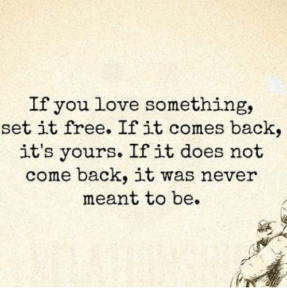Do you ever feel like you’re holding on to things too tightly? That you need to let go to move forward? If so, you’re not alone. In this blog post, we will discuss the very famous quote “If you love something set it free”, the power of letting go, and how it can help you achieve your goals. We’ll also talk about some tips for letting go of the things that are no longer serving you. So if you’re ready, let’s get started!
Contents
What Does This Saying Mean?

When we say “if you love something, set it free,” what we mean is that sometimes the best way to show our love for someone or something is to let it go. This can be a difficult thing to do, but it’s important to remember that letting go does not mean giving up. It simply means giving the person or thing the space they need to grow and flourish.
Why Do We Tend To Hold On?
One of the main reasons we tend to hold on to things is because we’re afraid of change. We may be afraid that if we let go, we’ll never get that thing back. But the truth is, change is a natural part of life and it’s often for the best. When we’re able to let go of the things that are no longer serving us, it allows us to make room for new and better things to come into our lives.
Oftentimes, having a strong emotional connection can also make us view things irrationally. We might be aware that a particular person/situation may not be suitable, but we still cling to it because of the sense of familiarity.
Attachment styles also play a huge role in how we perceive our relationships and surroundings. Majorly, people with an anxious-insecure attachment style have the most difficulty in establishing boundaries, identifying the need to let go, and having healthy codependency. This can prove to be burdensome and emotionally taxing for both parties.
Why Holding On Can Be Harmful?

While it’s understandable to want to hold on to the things we love, there can be some harmful effects of holding on too tightly. When we’re afraid to let go, it can prevent us from moving forward in our lives. We may miss out on new opportunities or experiences because we’re too busy hanging onto the past. Additionally, holding onto something too tightly can damage the thing we’re trying to hold onto.
For example, have you ever had a friend who was always clingy and needy? While they may have meant well, their neediness often drove you away. The same principle applies to anything else in life. When we try to control everything, we often end up losing what we were trying to keep in the way.
Why Is Letting Go Important?
There are many reasons why letting go is important. For one, it can help us achieve our goals. If we’re holding on to something too tightly, we may not be able to see other opportunities that are available to us. Additionally, letting go can help us create more balance in our lives.
How To Know When To Let Go?
There are a few things to consider when trying to decide if it’s time to let go of something.
Some tell-all signs that it is time to let go may include:
- feeling uncertain
- constantly feeling like walking on eggshells
- double guessing
- fantasizing about alternatives
- unprecedented feelings of regret or mental suffocation
- observing a significant change in the way you feel
- feeling like you are facing a dead-end
- hindrances in your growth
- thinking about it makes you anxious/stressed
Tips For Letting Go

Now that we’ve talked about why letting go is important and how to know when it’s time to do so, let’s discuss some tips for actually letting go.
Seek professional help
Approaching a therapist will help you process the feelings of hurt, betrayal, sadness, and grief. Additionally, it will also benefit you to form coping strategies for getting over the person/situation, building resilience, boosting self-confidence, as well as providing a sense of wholeness and independence.
Prioritize yourself
Remember that at the end of the day, you are the only person who will be there for you. Respect your struggles, hardships, and difficulties. Treat yourself the way you would like others to treat you. Qualities like self-compassion, care, gratitude, patience, and empathy are crucial to feeling self-sufficient.
Be realistic
It is essential to be realistic about life scenarios. It might hurt, but it is extremely important to face the truth and cope with it the way it is, instead of living in delusion about something that is not right for you.
Lean On Your Support System
Seek support, love, gratitude, and appreciation from the people around you. Peers, family, colleagues, and other aspects of social support can help in enhancing the feelings of belongingness, appreciation, and self-esteem.
Practice Mindfulness
Being aware and consciously in touch with your inner self, as well as your surroundings, can help you view things from a rational, informed, and calm perspective. This is important to do to make positive decisions.
Honor The Past
Cherish the good times, keep positive memories, and accept that person’s presence as a matter of good significance instead of demeaning or villainizing it.
Learn From Mistakes
While one can’t change or alter what has already happened, we can learn from our mistakes and attempt to not repeat them in the future. This allows room for accommodating new perceptions and incorporating healthy changes.
Conclusion
Letting go can be difficult, but it’s important to remember that it doesn’t mean giving up. It simply means giving the person or thing the space they need to grow and flourish. If you’re struggling to let go of something, try using some of the tips we discussed in this blog post. And always remember, the power of letting go is ultimately up to you.
A Word From Therapy Mantra
Your mental health — Your psychological, emotional, and social well-being — has an impact on every aspect of your life. Positive mental health essentially allows you to effectively deal with life’s everyday challenges.
At TherapyMantra, we have a team of therapists who provide affordable online therapy to assist you with issues such as depression, anxiety, stress, workplace Issues, addiction, relationship, OCD, LGBTQ, and PTSD. You can book a free therapy or download our free Android or iOS app.


